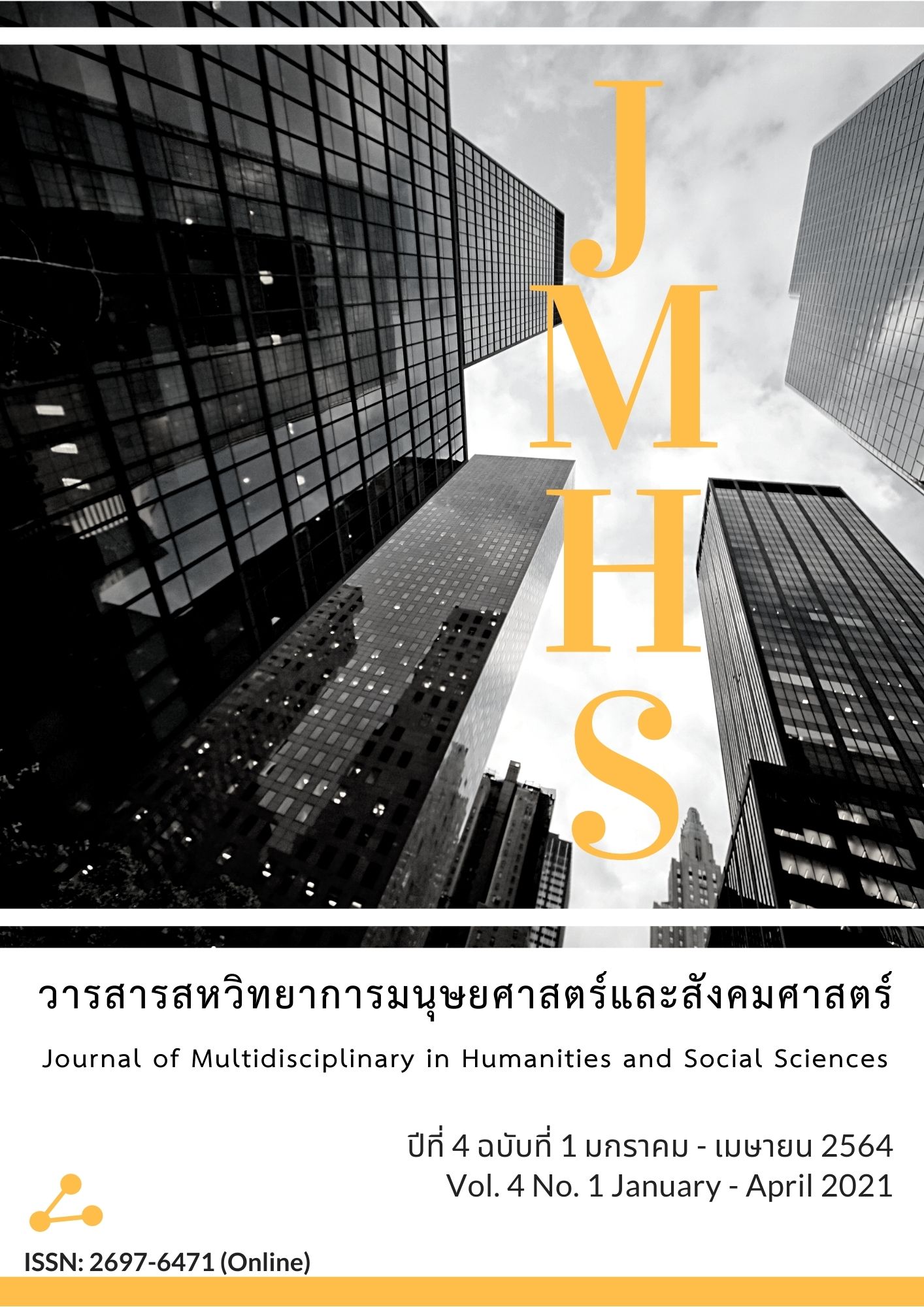Educational Approaches of Santi Asoke Buddhist Organization In The Digital World
Main Article Content
Abstract
The purposes of this study were as follows: 1) to study the problems of Educational Approaches of Santi Asoke; and 2) to study the direction of Educational Approaches of Santi Asoke Buddhist Organization in The Digital World. The study was a qualitative research. The researcher studied from key informants which were 20 people of confederate Educational Approaches of Santi Asoke Buddhist Organization. They were selected by key informants the instrument for collecting data were in-depth interviews, Analysis data by descriptive content analysis methods. The research results were found as follows: 1. The Santi Asoke Buddhist Organization has Educational Approaches by lifelong education for all members, including but not limited to genders, all ages, and the general public, believe in human’ potential, human can develop knowledge, ability, attitude for making Better life. The ultimate purpose in life is to enter delivered from suffering that determines a cha of suffering by using formal education, non-formal education, and informal education. However, the impact of digital transformation having on today’s society and lifestyles. The Santi Asoke Buddhist Organization has our philosophy, beliefs, ideas, and goals that remain unchanged which the learning styles of education management for everyone could be adapted to be suited with the era of the digital world; and 2. The direction of Educational Approaches of Santi Asoke Buddhist Organization in the digital world were 1) awareness of education, 2) access, 3) awareness of digital, 4) digital literacy, 5) self-direct learning, 6) opportunity, 7) knowledge management, 8) environment learning, and 9) development facilitator.
Article Details
Views and opinions appearing in the Journal it is the responsibility of the author of the article, and does not constitute the view and responsibility of the editorial team.
References
ชลาธิป ชาญชัยฤกษ์. (2558). Think outside the box. สืบค้นจาก https://www.culi.chula.ac.th/salc/
images/Eng%20today/Eng.-57%20_Think%20outside%20the%20box.pdf
ชาย โพธิสิตา. (2550). ศาสตร์และศิลป์แห่งการวิจัยเชิงคุณภาพ. กรุงเทพฯ: อมรินทร์พริ้นติ้ง.
พิชญ์สินี มะโน. (2562). ผลกระทบจากการเปลี่ยนแปลงในยุค DIGITAL DISRUPTION ต่อการศึกษา.
วารสารครุศาสตร์อุตสาหกรรม, 18(1), 1-6.
มูลนิธิสมเด็จพระเทพรัตนราชสุดาฯ สยามบรมราชกุมารี. (2559). รวมปกฐกถาพระราชนิพนธ์สมเด็จ
พระเทพรัตนราชสุดาฯ สยามบรมราชกุมารี การศึกษากับการพัฒนา. กรุงเทพฯ: นานมีบุ๊คส์
พับลิเคชั่น.
วีซานา อับดุลเลาะ และวุฒิชัย เนียมเทศ. (2563). การจัดสภาพแวดล้อมการเรียนรู้เพื่อส่งเสริมทักษะ
การเรียนรู้ในศตวรรษที่ 21 “แนวคิด ทฤษฎี และแนวทางปฏิบัติ”. วารสารมหาวิทยาลัย
นราธิวาสราชนครินทร์ สาขามนุษยศาสตร์และสังคมศาสตร์, 7(2), 227-246.
ศิริรัตน์ แอดสกุล. (2555). ความรู้เบื้องต้นทางสังคมวิทยา. กรุงเทพฯ: สำนักพิมพ์แห่งจุฬาลงกรณ์
มหาวิทยาลัย.
สตีฟ แคส. (2561). คลื่นลูกที่สามแห่งยุคอินเทอร์เน็ต. นรา สุภัคโรจน์ (แปล). กรุงเทพฯ: เนชั่นบุ๊ค.
สมณะโพธิรักษ์. (2563). สัมภาษณ์, 23 เมษายน 2563.
สำนักงานคณะกรรมการข้าราชการพลเรือน. (2563). Digital literacy คืออะไร. สืบค้นจาก
https://www.ocsc.go.th/DLProject/mean-dlp.
สำนักงานสถิติแห่งชาติ. (2560). สรุปผลที่สำคัญการสำรวจการใช้เทคโนโลยีสารสนเทศและการ
สื่อสารในครัวเรือน พ.ศ. 2560. กรุงเทพฯ: สำนักสถิติพยากรณ์.
สำนักบริหารงานการมัธยมศึกษาตอนปลาย. (2553). การเรียนรู้ดิจิทัลเทคโนโลยีโรงเรียนมาตรฐานสากล. กรุงเทพฯ: โรงพิมพ์ชุมนุมสหกรณ์การเกษตรแห่งประเทศไทย.
อติพร เกิดเรือง. (2560). การส่งเสริมการเรียนรู้ในศตวรรษที่ 21 เพื่อร้องรับสังคมไทยในยุคดิจิทัล. วารสารวิชาการ มหาวิทยาลัยราชภัฏลำปาง, 6(1), 173-183.
อาชัญญา รัตนอุบล. (2557). คำจำกัดความ แนวคิดและลักษณะการศึกษาตลอดชีวิต การศึกษาและการเรียนรู้ตลอดชีวิต. กรุงเทพฯ: โรงพิมพ์จุฬาลงกรณ์มหาวิทยาลัย.
อุไรพร ชลสิริรุ่งสกุล. (2557). Digital of Things สรรพสิ่งสื่อสารผ่านดิจิทัล. กรุงเทพฯ: กรุงเทพธุรกิจมีเดีย.
Mediasmarts. (2020). Digital Literacy Fundamentals. Retrieved from http://mediasmarts.ca/digitalmedia-literacy-fundamentals/digital-literacy-fundamentals
Phrapalad Somchai Payogo (Damnoen). & Phumphongkhochasorn, P. (2020). The Development of the Innovative Model of School Administration in the Secondary Education Area Office 18. Solid State Technology, 63(2s), 2058-2065.
Phrapalad Somchai Payogo (Damnoen). et al. (2020). Factors Affecting Decision Making to Study Massive online open Course (MOOC) for Bachelor Degrees in Bangkok. Solid State Technology, 63(5), 4685-4694.


